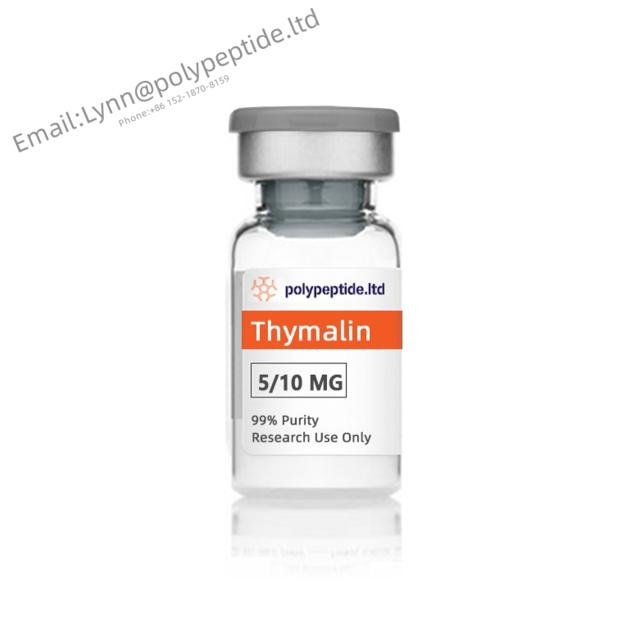Advertisements



Buy Thymalin lyophilized powder for sale from reliable peptide manufacturer-Polypeptide.ltd
| Price: | US$ 60 / Box |
|---|---|
| Minimum Order: | 1 box |
| Payment Terms: | TT,Virtual currency |
| Port of Export: |
Product Details
| Model No.: | Brand Name: |
|---|
| Certification: | |
|---|---|
| Specification: | Thymalin is a synthetic derivative of Thymulin, a peptide involved in the regulation of inflammation and pain. Studies indicate that Thymalin has potential in enhancing immune function, combating heart disease, and regulating sleep-wake cycles. It has also garnered attention in the field of aging research due to its capacity to decrease all-cause mortality in mouse models and extend lifespan. |
Packaging & Delivery
| Packaging: | |
|---|---|
| Delivery/Lead Time: | |
| Production Capacity: | Provide customization |
Product Description
Thymalin is a synthetic derivative of thymulin, which was originally isolated from the thymus in 1977. Thymalin has demonstrated its involvement in regulating inflammation and pain, exerting neuroprotective effects, and playing a crucial role in immune function. Initial research findings suggested that thymalin, along with other extracts from the thymus and pineal gland, may have the potential to extend lifespan.
If you need to buy Thymalin, you need to find a reliable and reputable seller. Polypeptide.ltd is a manufacturer in China who focuses on the research of peptide products, and it can provide a competitive price for bulk orders. You can buy pharmaceutical grade products from Polypeptide.ltd.
Thymalin Research and Life Extension
Research conducted in Russia at the beginning of the 21st century demonstrated that thymalin has a normalizing effect on various physiological functions in elderly individuals. The study observed improvements in cardiovascular, immune, and nervous system function among older adults. Additionally, participants exhibited enhanced metabolism and a tendency toward homeostasis similar to that of much younger individuals. The findings of the study revealed significant reductions in acute respiratory disease, hypertension, osteoporosis, ischemic heart disease, and arthritis symptoms. Notably, the population receiving thymalin during the trial experienced a 2-fold decrease in mortality rates.
Thymalin Research and Immune System Function
Extensive research on the impact of thymalin on the immune system has uncovered significant findings. The peptide primarily influences cellular immunity by modulating levels of lymphocyte subpopulations, influencing T-cell differentiation, and modifying the activity of natural killer (NK) cells. This is particularly significant because several chronic medical conditions, like diabetes, can disrupt cellular immunity and gradually progress to severe immunosuppression, rendering individuals more susceptible to infections and cancer.
Thymalin Research and Cancer
Research conducted in mice indicates that thymalin could serve as an effective adjuvant to pulsed laser radiation, which is used for the treatment of certain types of cancer. Neodymium lasers are commonly employed for the treatment of cancerous and precancerous skin lesions, including melanoma, with moderate to high success rates. This technique is particularly valuable in preventing metastasis. However, the concurrent administration of thymalin during laser therapy has shown the potential to extend the benefits of pulsed laser therapy. Thymalin has been observed to increase the number of antibody-producing cells in the spleen when used in combination with laser therapy. This synergistic effect may lead to a more significant suppression of tumors and improve the likelihood of achieving higher rates of remission or cure.
Thymalin and Psoriasis
Psoriasis is an inflammatory condition that specifically affects the skin and joints. Clinical studies have demonstrated that the combination of thymalin with standard treatments for psoriasis leads to enhanced laboratory indicators of the condition. Significantly, these improvements in laboratory measures of psoriasis activity align closely with the improvement observed in the patient’s clinical condition. This correlation highlights the measurable and observable impact of thymalin on the disease’s status.
Thymalin Research and Tuberculosis
In a study involving patients with severe progressive pulmonary tuberculosis, two treatment groups were formed: one receiving standard antibiotic therapy and the other receiving a combination of antibiotic therapy and thymalin. The group receiving thymalin demonstrated significant improvements in clinical cure rates compared to the group receiving antibiotic therapy alone. Furthermore, when the thymalin/antibiotic therapy was tailored specifically to the individual patient’s needs, an impressive cure rate of nearly 95% was achieved. This is of great importance as tuberculosis is increasingly developing resistance to both standard and experimental antibiotic regimens, which typically involve multiple antibacterial drugs. Administering thymalin early in the infection has proven to be particularly effective.
Thymalin Fights Kidney Disease
Research suggests that patients with chronic glomerulonephritis, an inflammatory kidney disease, may experience positive effects from thymalin treatment. In a clinical study involving Russian patients, individuals who received thymalin demonstrated improvements in kidney function and reductions in blood markers of inflammation. Additionally, immunologic measurements of the disease showed improvements, which could potentially lead to reduced kidney damage, remission, or, at the very least, a delay in the need for dialysis or transplantation.
Thymalin and Circadian Rhythm Disturbances
Evidence from studies in rats has revealed a connection between alterations in thymic factors and changes in circadian rhythms. These changes have been found to impact both cellular and humoral immunity. The research suggests that seasonal variations in the day-night cycle can affect the peak levels of thymus function, leading to immune system suppression. This finding, which includes changes in antibody levels, may help explain why respiratory illnesses such as colds and the flu are more prevalent during the shorter days of winter. Additionally, it may shed light on why the elderly are more susceptible to infections, as aging often disrupts their circadian rhythm. While thymalin administration does not reset circadian cycles, it does address the immune deficiencies associated with sleep-wake cycle disturbances. This suggests that thymalin could be an effective method for preventing infections, potentially surpassing the efficacy of certain vaccines, such as the flu vaccine.
Thymalin Research and Heart Disease and Atherosclerosis
Preventing heart disease is generally easier than treating it. Once heart disease is present, reversing it requires extreme dietary measures and a significant amount of time and commitment. However, research conducted in rabbits suggests that thymalin may have the potential to both prevent and reverse heart disease. Thymalin achieves this by reducing lipid levels and directly influencing lymphocytes responsible for plaque removal from arterial walls. The research indicates that thymalin normalizes T-cell suppressor activity and enhances sensitivity to factors that contribute to the development of atherosclerosis, thus reducing or eliminating immune dysfunction associated with plaque formation. In summary, thymalin appears to mitigate the dysfunctions that typically impede the immune system’s ability to combat heart disease.
Thymalin Research and Postoperative Risk and Complications
Research conducted in Russia suggests that thymalin could potentially serve as an effective preventive measure against postoperative infections and inflammatory complications. In addition to blood clots, infections are a significant concern following surgical procedures. Infection, particularly after orthopedic surgery, poses a substantial risk of mortality among postoperative patients. Therefore, any intervention that reduces the likelihood of postoperative infections could have a significant positive impact on healthcare. It may enable the surgical treatment of patients who would otherwise be considered high-risk and decrease the occurrence of adverse events associated with major surgical procedures.
Thymalin Research and Gum Disease
Periodontitis is characterized by inflammation of the gums and supporting structures of the teeth, and it is not only painful but also a significant contributor to tooth loss. While regular dental visits and proper oral hygiene can prevent periodontitis, treating it becomes challenging once it develops. Recent research indicates that thymalin may play a role in reducing inflammation and enhancing the specific cellular immune response needed to combat the bacterial infection underlying periodontitis.
Thymalin Research and Anorexia
Changes in circulating thyroid hormone levels are frequently observed in individuals with anorexia nervosa. These hormonal changes are believed to contribute to alterations in peripheral lymphocyte levels and the suppression of immune function commonly observed in this population. Thymalin administration has shown potential in reversing the immune changes associated with anorexia nervosa and may even help counteract thymic atrophy in these patients. It is important to note that since thymalin relies on zinc for its optimal function, individuals with anorexia would require zinc supplementation alongside thymalin to ensure its maximum efficacy. Ongoing clinical research is being conducted in this area.
Thymalin and Immune Regulation
Research conducted thus far has revealed that the primary benefits of thymalin stem from its influence on cellular immune function. By enhancing cellular immunity, particularly the function of T-cells, thymalin plays a crucial role in restoring the body’s equilibrium, combating infections, slowing down cancer progression, preventing heart disease, and reducing inflammation and dysfunction. While ongoing research continues to explore its potential applications, certain clinical uses of thymalin have already become standard therapies over the years. Moreover, there is hope that thymalin could enhance the efficacy of vaccines and antibiotics, a crucial development in the face of the growing number of drug-resistant superbugs.
Thymalin has shown minimal side effects and exhibits excellent subcutaneous bioavailability in mice, although the dosage per kilogram in mice does not directly translate to humans. Thymalin available for purchase at Peptide Sciences is strictly limited to educational and scientific research purposes and is not intended for human consumption. It should only be acquired by licensed researchers.
Contact information:
Official website:https://*/product/thymalin/
Phnone number:+86 15218708159
Email:Lynn at polypeptide.ltd

|
SUPPLIER PROFILE
|
|||
|---|---|---|---|
| Company: | Polypeptide.ltd | ||
| City/State | shenzhen, China | Country: |
China 
|
| Business Type: | Export - Manufacturer / Trading Company | Established: | NA |
| Member Since: | 2023 | Contact Person | Lynn he |
SUPPLIER PROFILE
City/State/Country -
shenzhen, China
China 

Business Type -
Export - Manufacturer / Trading Company
Established -
NA
Member Since -
2023
Contact Person -
Lynn he



